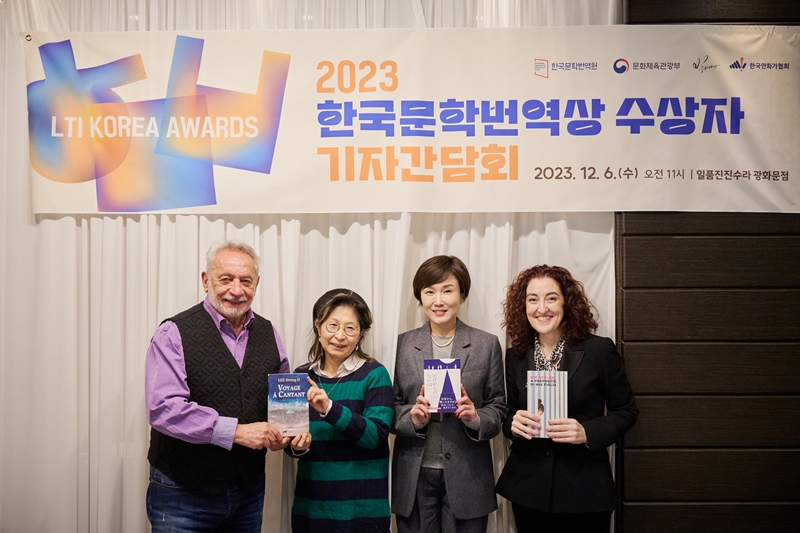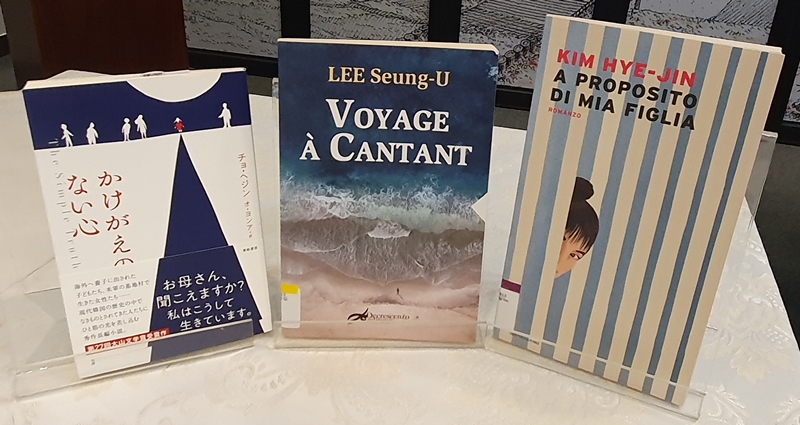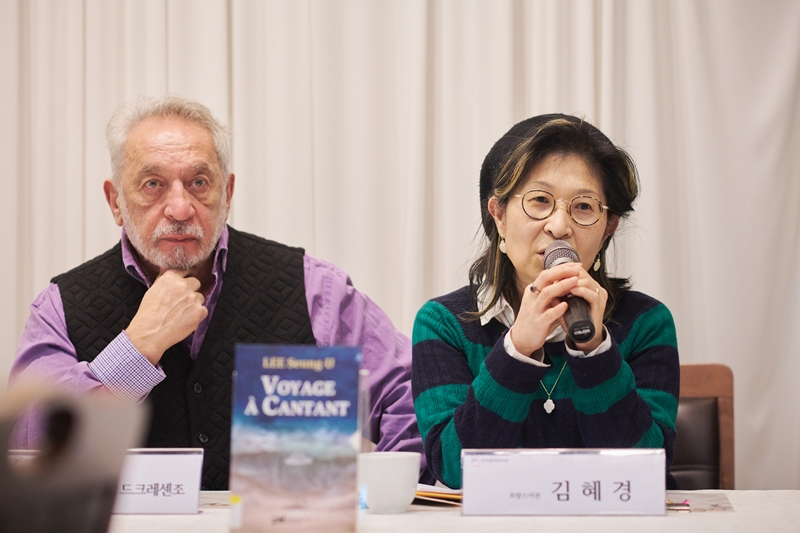
The four grand prize winners of this year's Literature Translation Institute (LTI) Korea Awards on Dec. 6 pose for photos at a news conference held in Seoul's Jongno-gu District. From left are Jean-Claude De Crescenzo, Kim Hye-gyeong, Oh Young-a and Lia Iovenitti (LTI Korea)
By Lee Kyoung Mi
"Can we say translation is the 'art of hesitation?' You hesitate endlessly, just a bit better."
Lia Iovenitti of Italy said this about translating Korean literature after receiving an award from the Literature Translation Institute (LTI) Korea for her Italian-language edition of Kim Hye-jin's novel "Concerning My Daughter." She described conveying a country's literary work in another tongue as agonizing and difficult.
The news conference for the LTI Korea Awards ceremony on Dec. 6 was held at a restaurant in Seoul's Jongno-gu District. Four translators -- Kim Hye-gyeong and her husband Jean-Claude De Crescenzo (French), Oh Young-A (Japanese) and Iovenitti -- were the four grand prize winners.
"I'm glad to be able to convey feelings that are very personal and Korean yet extremely universal to Italian readers on the other side of the world," Iovenitti said. "I sought to translate the writer's voice and intent exactly as is."
She is now translating into Italian Han Kang's novel "I Do Not Bid Farewell," which recently won this year's Prix Medicis, a prestigious French literary prize.

Shown are the translations of this year's winners of the LTI Korea Awards. From left to right is the Japanese-language edition of Cho Hae-jin's "Simple Sincerity," French-language version of Lee Seung-u’s "Voyage a Cantant" and Italian-language translation of "Concerning My Daughter." (Lee Kyoung Mi)
Oh, who said she is captivated by Korean literature's sophisticated writing style, said, "I started translating Korean literature because after reading the works of authors such as Eun Hee-kyung and Kim Yeon-su, I wanted to introduce these wonderful writers in a lighthearted way."
"I'm deeply moved to receive this award 100 years after my grandparents moved to Japan," the third-generation ethnic Korean in Japan said. "It feels like I got a large circle for learning (doing well) over all this time," she added with a big grin.
Oh won for her highly acclaimed translation of "Simple Sincerity" into Japanese, earning praise for properly utilizing an elegant writing style and narrative structure.
The four honorees also discussed the growing popularity of Korean literature abroad, with one saying, "The strength of Korean literature has expanded and gotten rejuvenated across various genres."
"In the past, only those who knew Korean literature read it but it has since grown very popular and its market has expanded," Oh added. "Just a few Korean books were published (in Japan) in the past, but over 100 have come out since the 2020s."
On the growing diversity of Korean literature on the French market, De Crescenzo said, "Because many works by young writers have been introduced since the mid-2010s, even webtoons have been published in hardcover along with works in genres such as LGBTQ, science fiction and poetry."
Running a publisher specializing in Korean literature, he added, "I will publish a bigger diversity of Korean literary works into French to globalize Korean literature."

Translator Kim Hye-gyeong (right), who won one of this year's grand prizes from LTI Korea with her French husband Jean-Claude De Crescenzo, on Dec. 6 discusses her craft at a news conference held at Seoul's Jongno-gu District. (LTI Korea)
De Crescenzo and his wife Kim jointly translated "Voyage a Cantant," a novel set in France that won them the award. She described an episode during the process in which she faced difficulty from the beginning.
"The problem began with the first sentence," she said. "The phrase 'a small coastal city not appearing on a map' is fine in Korean but makes no sense in French. In France, a 'city' can neither be so small to not appear on a map nor can such a small town house a three-story hospital. I couldn't resolve this, so I called the author Lee Seung-woo and we brainstormed until we reached a conclusion."
The institute's honors are divided into three categories: translation, translation by aspiring translators and outstanding service.
The awards go to translators of foreign-language renditions of Korean literature published abroad over the past two years before screening. The works are selected based on criteria such as " understanding of the original work, accuracy and completeness of the translation, and overseas reception of the work."
This year, LTI Korea gave four grand, two achievement and 19 newcomer awards.
km137426@korea.kr